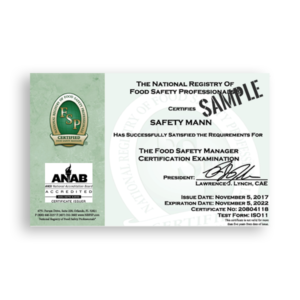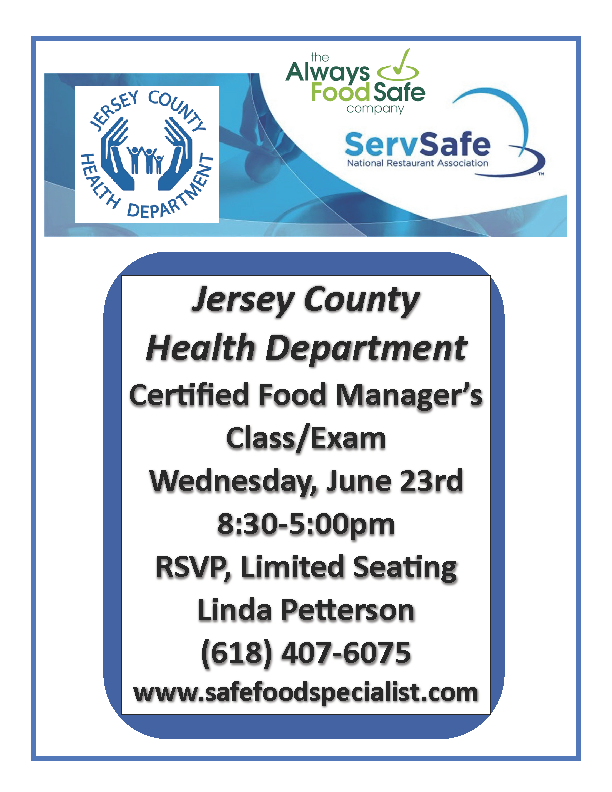Everything You Need to Prosper in the ServSafe Manager Certification Examination
Qualified Food Supervisor: The Secret to Safe and Compliant Operations
The role of a Certified Food Supervisor (CFM) is significantly identified as necessary in keeping certified and secure procedures within the food solution sector. By applying rigorous food handling and prep work standards, CFMs play a critical role in mitigating dangers connected with foodborne diseases and ensuring adherence to regulatory needs. Nevertheless, the impact of their expertise prolongs past conformity; it cultivates a setting of liability and operational effectiveness. Recognizing the full scope of their contributions questions regarding the more comprehensive ramifications for services and customer count on in food security practices.
Role of a Certified Food Supervisor
The role of a Certified Food Supervisor is crucial in guaranteeing food safety and compliance within food service establishments. These experts are accountable for supervising all aspects of food prep work, handling, and storage, ensuring that facilities comply with wellness guidelines and industry standards. Their training outfits them with the understanding to identify potential dangers, apply correct food safety and security practices, and keep hygiene methods.
Certified Food Supervisors play a critical function in training and supervising kitchen personnel, instilling a society of safety and conformity throughout the facility. They conduct normal assessments to recognize locations that require enhancement and ensure that corrective actions are executed swiftly - ServSafe Manager Certification. Furthermore, they are charged with developing and implementing basic operating procedures (SOPs) related to food safety, which act as a guide for workers
Their proficiency expands to keeping an eye on food temperatures, stopping cross-contamination, and managing allergen controls, all of which are necessary to protecting public health and wellness. Additionally, Licensed Food Managers are often the key point of call throughout health and wellness inspections, representing their facilities and resolving any kind of compliance issues raised by wellness authorities. Inevitably, their commitment to food safety and security is vital for keeping consumer count on and securing the track record of food service organizations.
Importance of Food Safety
Food security is consistently a leading concern in the food service sector, as it directly influences public wellness and customer self-confidence. Making sure that food is managed, prepared, and stored securely helps to avoid foodborne illnesses, which can lead to severe health and wellness difficulties and also fatalities. The financial repercussions of foodborne break outs can be staggering, causing costly recalls, lawsuits, and substantial damage to a business's online reputation.
Additionally, food safety techniques cultivate a culture of responsibility and professionalism and trust within food establishments. When staff members are learnt correct food handling techniques, they are more probable to comply with security protocols, which minimizes the risk of contamination. This not just shields customers however also enhances functional effectiveness and compliance with neighborhood health regulations.
Consumer recognition concerning food safety has actually raised dramatically, leading to increased assumptions for transparency and high quality in food solution. Establishments that focus on food security are more most likely to acquire client trust fund and loyalty, inevitably contributing to their lasting success. Spending in robust food security actions is not just a governing responsibility; it is a basic business strategy that benefits both customers and food solution operators alike.
Training and Accreditation Refine
Understanding the training and accreditation procedure for food managers is critical for maintaining high requirements of food safety within any type of facility. The procedure generally starts with thorough training programs that cover important subjects such as foodborne illnesses, appropriate food taking care of methods, and hygiene practices. ServSafe Food Manager Certification. These programs can be delivered through different layouts, consisting of on-line training courses, in-person classes, or workshops, and are designed to gear up food managers with the understanding needed to avoid food security dangers
Upon conclusion of the training, candidates have to pass an accreditation examination, which examines their understanding of food security ServSafe Manager principles and laws. The test is generally provided by recognized companies, ensuring that the certification is recognized and respected within the sector.
Once accredited, food managers are needed to stay existing with ongoing education and training to maintain their qualifications. This might consist of attending refresher courses or taking part in workshops that address new food security methods and policies. Overall, a durable training and accreditation procedure not only enhances the abilities of food supervisors but additionally adds to the overall safety and security and conformity of food operations in any kind of facility.
Compliance With Rules
Conformity with regulations is a vital aspect of a food supervisor's responsibilities, as it ensures that facilities follow neighborhood, state, and federal food safety and security requirements. These regulations are made to reduce threats connected with foodborne diseases and advertise risk-free food taking care of methods. A qualified food manager (CFM) plays a pivotal duty in interpreting and applying these requirements within their procedures.

CFMs need to additionally create and apply surveillance systems to regularly evaluate compliance with food safety practices. This might entail regular examinations, document maintaining, and training sessions for personnel to strengthen risk-free food dealing with protocols (Certified Food Manager Certification). In the occasion of a governing assessment, a CFM's readiness can dramatically influence the outcome, as they will certainly be accountable for demonstrating adherence to all pertinent guidelines. Inevitably, reliable conformity management cultivates a society of safety and liability within food service operations.

Benefits of Employing CFMs
Working with certified food managers (CFMs) provides considerable benefits for food solution facilities seeking to improve their operational effectiveness and safety and security standards. CFMs have specialized understanding of food safety and security regulations, sanitation methods, and danger administration, making sure compliance with federal and regional legislations. This expertise assists minimize the probability of offenses that can bring about short-lived closures or pricey penalties.
In addition, CFMs play a crucial duty in training personnel, fostering a society of food safety within the establishment. They execute standardized treatments, monitor food taking care of practices, and perform regular audits, significantly lowering the danger of foodborne health problems. This not just safeguards customers however additionally improves the establishment's credibility.
In addition, employing CFMs can result in improved functional efficiency. Their training makes it possible for personnel to work better, lessening waste and taking full advantage of productivity. Facilities with certified food managers often experience higher customer fulfillment, as well-trained workers are much better geared up to make certain top quality solution and food safety and security.

Ultimately, spending in a qualified food supervisor is a financial investment in the long-term success and sustainability of a food solution procedure, creating a much safer atmosphere for both consumers and employees.
Final Thought
In final thought, the duty of a Licensed Food Supervisor is essential in keeping risk-free and compliant food solution procedures. With reliable oversight of food taking care of methods, continuous team training, and adherence to governing requirements, CFMs play a critical role in mitigating foodborne illness dangers. The financial investment in licensed management not just enhances functional efficiency yet additionally cultivates a culture of liability, ultimately profiting both the facility and its customers while advertising public health and safety.
The duty of a Certified Food Manager is important in making certain food safety and security and conformity within food solution facilities.Comprehending the training and certification process for food managers is important for preserving high standards of food safety within any kind of facility. Generally, a durable training and certification procedure not just improves the abilities of food supervisors however also adds to the general safety and conformity of food operations in any kind of facility.
Hiring qualified food supervisors (CFMs) offers substantial advantages for food solution establishments looking for to improve their operational effectiveness and safety criteria. Establishments with licensed food managers usually experience higher consumer fulfillment, as well-trained staff members are better outfitted to ensure high quality service and food security.